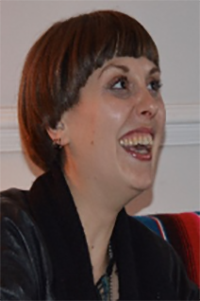Home » For and about students » Techne Community » Techne Students list » Elizabeth Atkinson

Elizabeth Atkinson
AHRC Techne funded doctoral student
Contact Zones: Processes between nonhumans and humans in contemporary art
Royal College of Art, London
Year of enrolment: 2016 -
Institution email: elizabeth.atkinson@network.rca.ac.uk
This research project will look to contemporary art practices, with the aim to establish a new method of analysis for humans with nonhumans. Increasingly rapid extinction of many species, the arrival of climate change and the designation of a geological epoch as so impacted by humankind called the Anthropocene, oblige us to urgently re-examine nonhumans and our relationship to them. Deploying theories of the post-human (Cary Wolfe), the animal question (Donna Haraway) and eco-criticism (Naomi Klein), this project will analyse a selection of artists who engage with nonhumans in a critical manner, to uncover an original and crucial method for change across these contact zones.
Artists studied include Pierre Huyghe, Abraham Cruzvillegas, Ben Rivers, Roni Horn and Julian Charriére. These eco-critical practices, exploring animal and plant life, nomads, the weather and climate change, respectively, propose how regenerative organic processes should be favoured over manmade destruction. I will explore how processes such as compostation, collective thinking (as seen in bees), (Weir, 2012,) and metamorphosis, deconstruct traditional anthropocentric structures of knowledge and language, and the position of the human, when they are exhibited as art. Analysing contemporary artists who critically engage with nonhumans, this research will propose an alternate method of interpreting the world. Raising issue with human disregard for, and destruction of, those with whom we share the planet, the perspective I aim to establish will elicit “mutual inclusion” in our contemporary moment of environmental crisis (Massumi, 2015).
Investigating artistic explorations of unfamiliar territory, I too will try to position myself outside traditional knowledge constructions. With this move, I hope to establish an original plane of mutuality, drawing nourishment from organic matter to uproot and break down traditional methods of categorisation. This project will propose how and why particular forms of nonhuman life matter to humans, in the hope of securing mutually beneficial changes across these contact zones.
